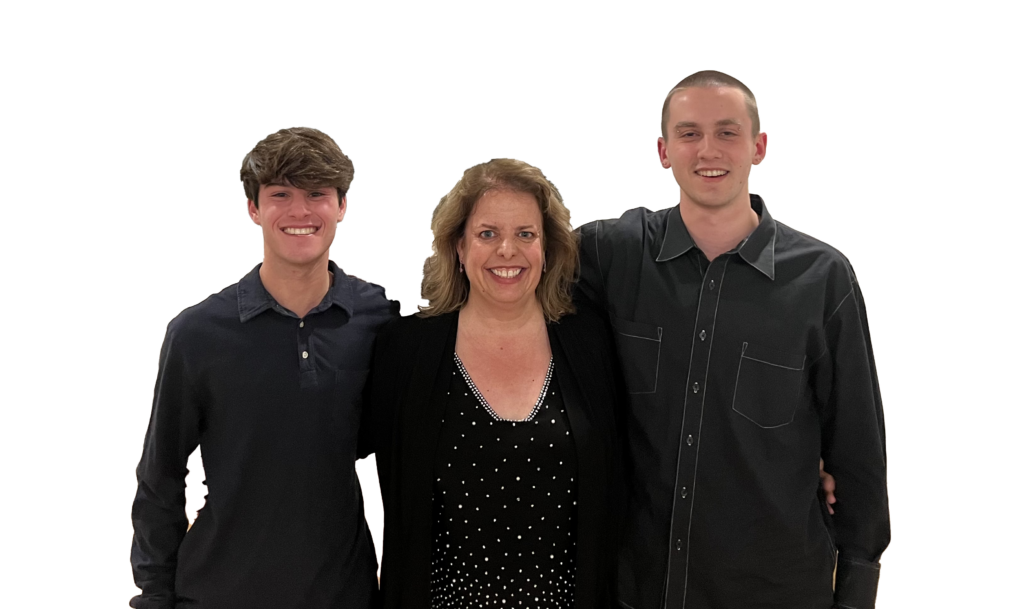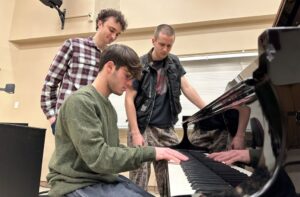The music department at Lafayette College fosters a collaborative learning experience through small class sizes and supportive faculty mentors, complementing an expansive liberal arts education with rigorous study of performance on our stage and beyond.
Piano compositions written by Owen York ‘26 and Conrad Tilroe ‘25 were performed by Professor Holly Roadfelt in Brooklyn on April 4 at an event held at Mise-En Place. Roadfeldt’s set, part of her project entitled “North American Narratives,” also featured music by Phillip Glass, Shelley Washington, Stephanie Ann Boyd, David Rakowski, and Professor Kirk O’Riordan, among other composers.
A music major with a minor in English, York likened songwriting to his other passion for the written word. “I’ve been pretty much writing music my whole life. I would just learn songs by ear and then just write stuff,” he said. “I was also writing stories, and for me music was very much about just telling stories.”
In terms of Roadfeldt’s setlist, the students found it hard to believe that their pieces were played among work from artists they studied and respected. “She’s playing some pretty big names, and then it’s just me and Conrad,” said York. “It’s sort of just like, woah.”
Tilroe’s piece “Reue” and “moulin à vent vagues” by York both premiered at the World Piano Day event held at Williams Center for the Arts this past month, where the students had the opportunity to watch Roadfeldt perform their pieces before an audience of Lafayette community members.
Looking back on the event, the students shared what it meant to them to see their work played onstage for the first time.
“It’s pretty overwhelming to hear that in that space with one of the best instruments in the world, and one of the best performers that I know,” Tilroe said. “It’s like stars aligning.”
“Having my teacher believe in me like that to play my piece in front of an audience, I don’t think she would do that if she didn’t think it was worth something, so that’s encouraging,” York said.
Both students composed their pieces specifically at Roadfeldt’s request. The small courses in the music department, averaging around 5 students per class, allow for more personal connections to develop between students and their instructors, leading to collaborations like this one.
York explained the value in Lafayette’s music department compared to the education a student might receive at a more competitive conservatory. “It’s such a small department that you meet everyone,” York said. “You get afforded opportunities that you probably wouldn’t get at a bigger school, so I’m definitely grateful for that.”
Tilroe, a music major with a history minor, echoed the benefits of close connections in the classroom. “Because you can take private lessons in composition and various instruments, you get very close attention from your mentors,” he said, “and that creates progress like nothing else.”
Both students dabble in sound recording in addition to songwriting. York, a CaPA scholar, purchased recording equipment with his scholarship money, which allowed him to experiment further while writing new music.
However, writing music is often an individual process that brings several challenges. While Tilroe and York both play piano, the pieces they composed for Roadfeldt are much more intricate and complicated, requiring a more advanced skill set to master. This made the song-writing process harder, as they could not fully conceptualize what their pieces would sound like before sharing them with Roadfeldt, whose piano expertise was needed to bring the songs to life.
York, who often refrains from playing his pieces digitally on composition software before hearing it played by a human hand, described the songwriting process as “a labor of love.” “You just have to believe in yourself,” he said.
Tilroe faced different challenges when composing “Reue.” He explained that he scrapped his entire piece three days before the deadline and started fresh, motivated by the impending deadline to work harder on fulfilling his vision.
“I didn’t know if it worked because I can’t play my piece. I’m not good enough of a pianist, so I constructed it all in little fragments and pieces and kind of stitched it together,” he said. “When Professor Roadfeldt played it, the care she showed every note, even the ones I wasn’t sure of, that was rewarding.”
“Honestly none of this would have happened if it wasn’t for her,” York said of Roadfeldt. “She’s probably the best musician I’ve ever met in person in my life…she’s just been amazing as a teacher.”
The student composers traveled to the city to watch Roadfeldt perform their pieces in front of an audience full of fresh faces. This event broadened the scope of people exposed to their work beyond the Lafayette campus.
“It feels like stepping into a larger world,” Tilroe said.

CaPA
The Maggin Creative and Performing Arts Initiative (CaPA) is a lifeline for artists across campus and beyond.

A celebration of sound exploration by Bryan Hay
Chemistry, music departments team up to celebrate World Piano Day article

